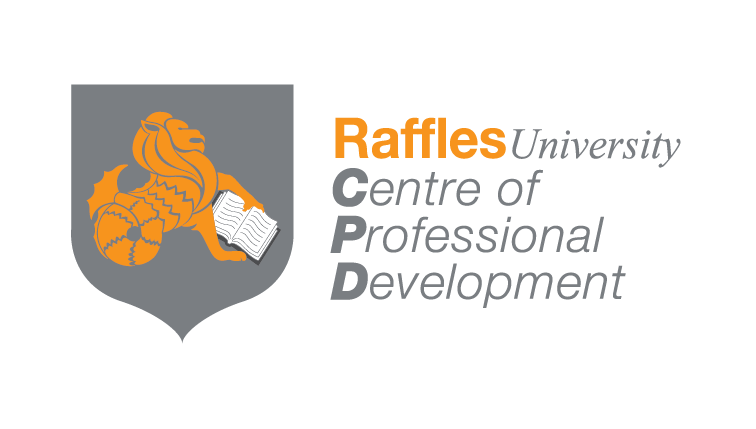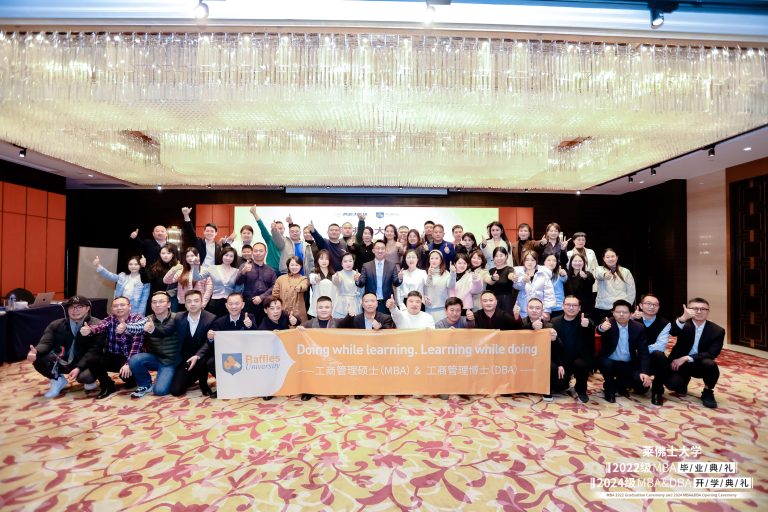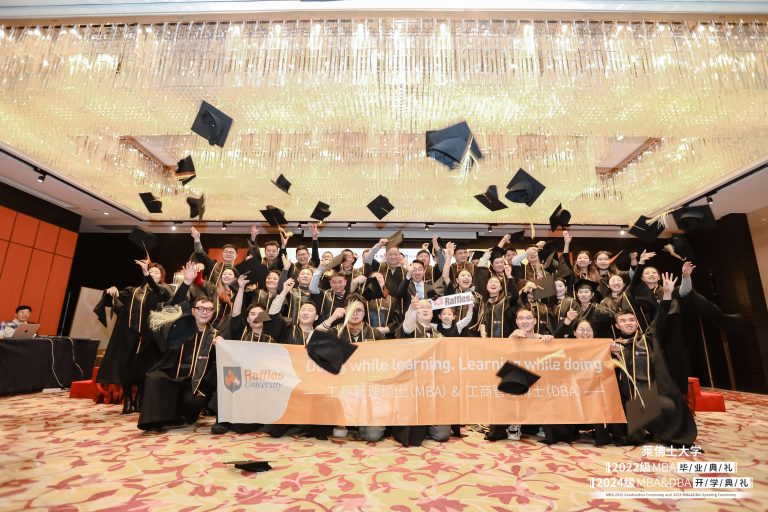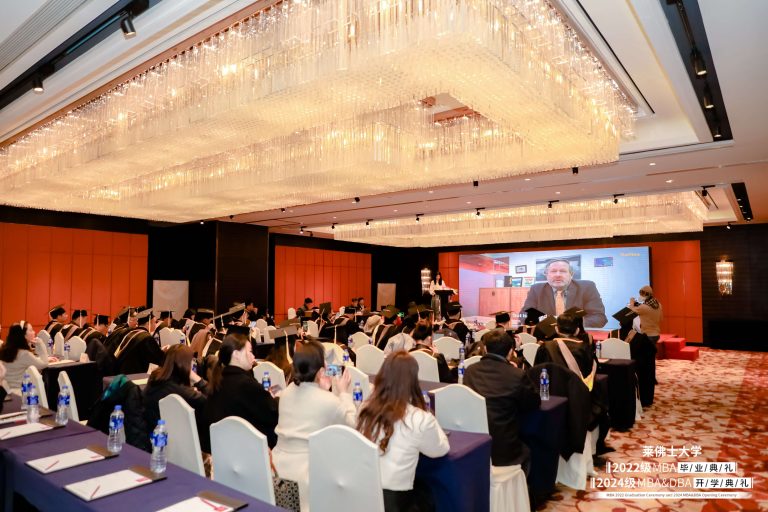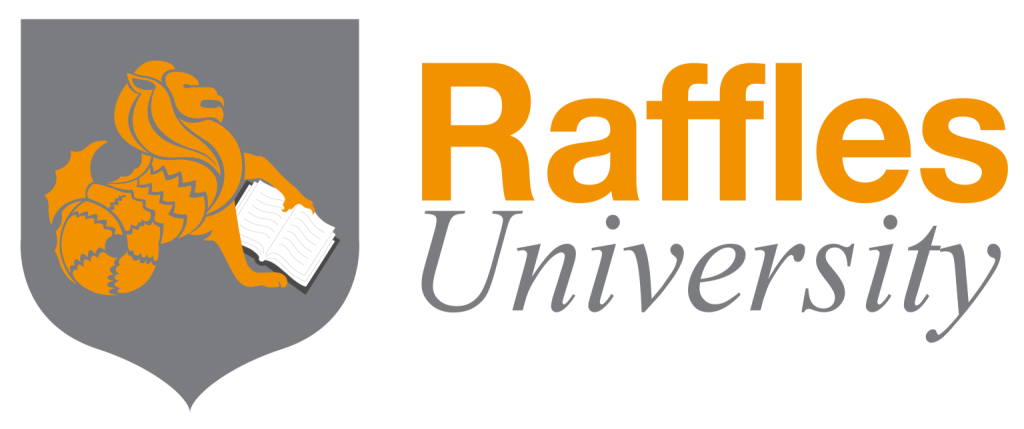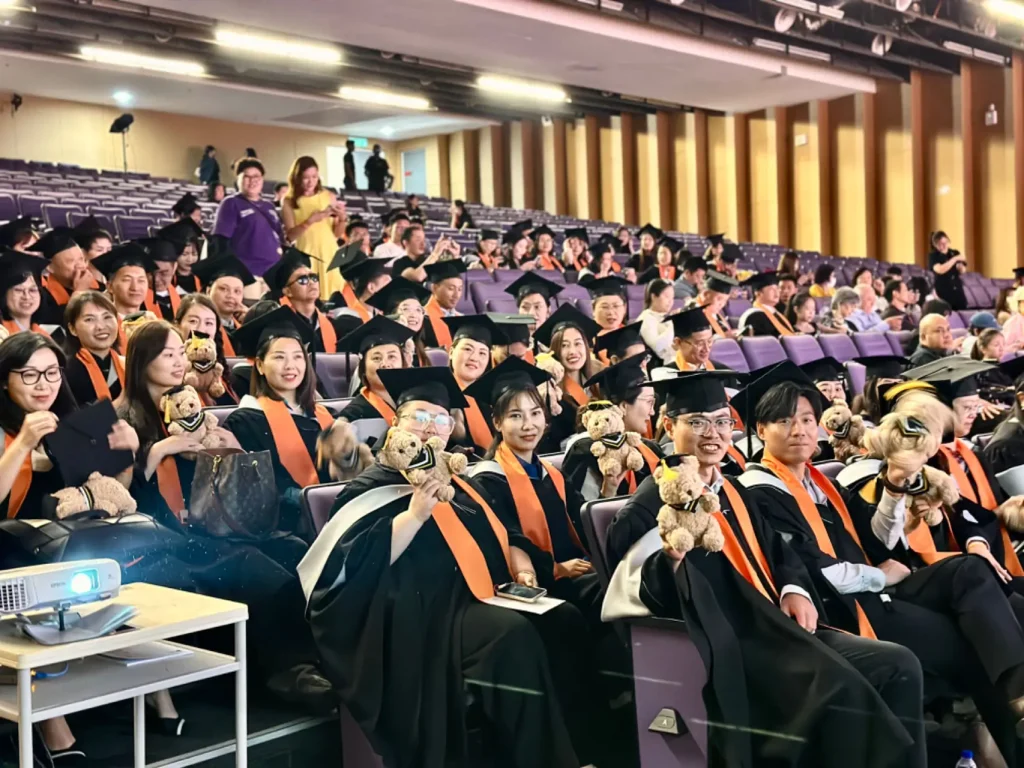
Executive Doctor
of Business Administration
RAFFLES
RAFFLES
Executive Doctorr
of Business Administration
OVERVIEW
The Executive Doctor of Business Administration (EDBA) programme is an applied terminal business degree, for experienced and aspiring professionals who already have a master’s degree related to business and are looking to boost their careers. The most distinguishing characteristic of this program is its accelerated curriculum, designed to graduate students in three years. This rigorous program provides an in-depth exploration of cutting-edge business theories, strategies, and practices.
Another defining factor of the EDBA program is its flexibility, allowing students to customise their studies by specialising their dissertation topics in virtually any of the major business areas of interest. Based on their own industry experiences and career goals, students can choose to focus on areas such as finance, marketing, operations, strategy, or human resource management. This approach ensures that participants graduate with the tailored knowledge and skills they need to make significant contributions to their chosen field of business.
Through this programme, participants will engage in advanced research, critical discussions, and practical applications. They will gain a comprehensive understanding of global business trends, emerging technologies, and organisational behaviour. Upon completion, they will be equipped with the leadership, analytical, and strategic skills necessary to drive organisational success at the highest levels.
Programme Length: Three-Year
Programme Delivery Mode: Online Learning
Programme Delivery Language: Chinese
Entry Requirements: A Master’s Degree and with 5 years relevant working experience
Certificate Award: Raffles University Executive Master of Business Administration, Executive Doctor of Business Administration,
Tuition Fee: 120,000 RMB (Includes 2,000 RMB application fee)

PROGRAMME MODULE
This course aims to provide students with a profound understanding of the fundamental theories and practices of operations management. Students will learn how to optimize production processes, enhance operational efficiency, reduce operational costs, and understand the application of modern operation management systems in a globalized environment. The course content covers key areas such as supply chain management, lean production, Six Sigma management, quality control, and operational strategic planning. Through case studies, group discussions, and simulation exercises, students will cultivate the ability to solve practical operational problems, preparing them for careers in manufacturing, service industries, or any field requiring efficient operations management.
This course aims to delve into the digital transformation in the business field, helping students understand the application of digital technology in modern business operations and its profound impact on enterprise strategy, management, marketing, and customer service. The curriculum covers core content such as digital trend analysis, business model innovation, data analysis, and network security, aiming to cultivate students’ ability to make effective decisions and manage in a digital environment.
This course focuses on developing students’ core skills in the field of financial management. Students will learn how to analyze a company’s financial condition, formulate financial strategies, evaluate the economic benefits of investment projects, and manage corporate financial risks. The course content covers financial statement analysis, capital budgeting, investment decision-making, cost management, short-term financial decision-making, long-term financing strategies, and more. Through real-world case studies, financial simulation games, and team projects, students will master the financial decision-making process and understand the impact of financial decisions on corporate strategy and performance.
This course aims to teach students the core principles and techniques of project management, enabling them to successfully plan, execute, and monitor projects. Students will learn how to develop project plans, allocate resources, manage project teams, control project schedules and budgets, and handle project risks. The course content covers key areas such as the project management lifecycle, project scope management, time management, cost management, quality management, risk management, and communication management. Through case studies, role-playing activities, and team projects, students will develop project management capabilities, preparing them for future project management positions in various organisations.
This course aims to cultivate students’ entrepreneurial spirit and guide them in developing successful new businesses from concept to execution. The content covers market analysis, business model development, financing strategies, team management, marketing, and more. Through case studies and hands-on practice, students will gain comprehensive knowledge of the entire entrepreneurship process and enhance their chances of success. Course features include industry-specific lectures and collaborative practical projects, aimed at helping students become future leaders in entrepreneurship.
This course aims to help students understand the importance of strategic planning and cultivate their ability to develop and implement effective strategies. Students will learn how to analyze the external environment, assess internal resources and capabilities, determine the organization’s mission and vision, and formulate long-term and short-term strategies. The course content covers key areas such as competitive analysis, SWOT analysis, PEST analysis, strategy formulation and selection, strategy implementation, and evaluation. Through strategic simulations and case studies, students will enhance their strategic thinking and decision-making skills, laying a solid foundation for future careers in top management or consulting.
This course aims to help students comprehensively understand and grasp the core theories and practical methods of leadership and change management. The course content covers the development process of leadership, leadership styles and techniques, the concepts and processes of change management, and more. Through diverse teaching methods such as case analysis, group discussions, and role-playing, students will learn how to effectively respond to challenges in organisational change, enhance leadership and team collaboration skills, laying a solid foundation for future career development.
This course aims to equip students with core knowledge in human resource management and talent strategy. It will focus on various aspects of talent recruitment, selection, training, motivation, and retention, exploring how to effectively attract and retain top talent to provide robust support for organizational development. Through this course, students will acquire practical skills and methods in talent acquisition and retention, enhancing their professional qualifications and practical abilities in the field of human resource management.
This course aims to provide students with a solid foundation in academic research methodologies. Students will acquire a comprehensive set of core methods and techniques related to research design, data collection, data analysis, and research report writing. The course content covers the fundamental frameworks of quantitative and qualitative research, the selection of research methods, the importance of literature review, and the application of statistical software for data analysis. Through a diverse range of teaching methods including lectures, case studies, group discussions, and hands-on practice, students will gain proficiency in the basic processes and methodologies of academic research, laying a solid foundation for further exploration in the academic field.
This course focuses on the fundamental theories of data analytics and the practical application of SPSS software. Through this course, students will acquire the basic skills of data collection, organization, analysis, and interpretation, and be able to utilize SPSS software for data management and statistical analysis. The course content covers key concepts and methods such as data preprocessing, descriptive statistics, inferential statistics, analysis of variance, regression analysis, etc. It aims to cultivate students’ ability to independently conduct data analysis and solve problems. Whether for academic research or business decision-making, data analytics and SPSS skills are indispensable tools.
This two-month research project aims to cultivate students’ ability to conduct independent academic research. Under the guidance of a supervisor, students will select a specific research topic, conduct in-depth literature research, data collection, and analysis, and ultimately write a comprehensive academic paper. The course will emphasize various aspects such as the formulation of research questions, the development of research design, the application of research methods, and the interpretation and discussion of research results. By participating in the research project, students will be able to exercise their independent thinking skills, innovative abilities, and practical abilities, thereby enhancing their professional quality and competitiveness in the academic field.
This course aims to provide students with valuable opportunities to gain in-depth insights into industry frontiers, corporate operational practices, and career development trends. Through a combination of field visits and/or workshops, students will be able to intuitively experience corporate culture, understand the operational models, technological innovations, market strategies, and industry development trends in different sectors. This will enhance students’ practical abilities, innovative consciousness, and comprehensive competitiveness.
Qualitative Methods for Research is an immersive and comprehensive course designed to equip students with the fundamental principles, tools, and techniques essential for conducting rigorous and insightful qualitative research. This course offers a deep dive into the world of qualitative inquiry, emphasizing the exploration of human experiences, behaviors, perceptions, and social phenomena through non-numerical, interpretive approaches.
Throughout the course, students will learn how to formulate research questions that are suitable for qualitative methods, understand the theoretical frameworks that underpin qualitative research, and engage with various qualitative methodologies such as phenomenology, grounded theory, ethnography, and narrative analysis. The emphasis is on developing a nuanced appreciation for the complexities of human experience and the ability to capture, analyse, and interpret qualitative data with sensitivity and rigour.
This an essential course designed to equip students with the foundational knowledge and practical skills necessary for conducting rigorous and evidence-based research across various disciplines. This course offers a comprehensive introduction to the principles, techniques, and tools of quantitative analysis, empowering students to design studies, collect and analyze data, and interpret results in a statistically sound manner.
Throughout the course, students will gain a deep understanding of fundamental statistical concepts such as descriptive statistics, probability distributions, hypothesis testing, and confidence intervals. These concepts serve as the building blocks for more advanced topics including correlation and regression analysis, analysis of variance (ANOVA), and multivariate statistical methods. The emphasis is on applying these methods to real-world research problems, fostering a critical and analytical mindset in addressing complex questions.
This 12-credit Research Thesis (Proposal Defense) course serves as a pivotal milestone in the master’s degree program, requiring students to formulate and defend a research proposal that outlines their intended thesis project. The course equips students with the necessary skills to conduct an in-depth literature review, identify research gaps, and develop a rigorous research methodology. Students engage in iterative feedback sessions with faculty mentors to refine their proposals, ensuring they are well-grounded in theory and feasible in practice. The culmination of the course is a Proposal Defense, where students present and justify their research plans to a panel of experts, demonstrating their readiness to embark on a substantial research endeavour.
This 16-credit Research Thesis (Final Viva-Voce) course marks the conclusion of the master’s thesis journey, where students present and defend their completed thesis work. This course builds upon the foundation laid in the Proposal Defense, challenging students to integrate their research findings, analyze data critically, and draw conclusions that contribute to the advancement of knowledge in their field. The Final Viva-Voce examination involves a rigorous oral defense of the thesis, where students must articulate their research objectives, methodology, findings, and implications to a panel of faculty and, in some cases, external experts. This course not only assesses the quality of the thesis but also evaluates students’ ability to communicate their research effectively and respond to critical questions. Upon successful completion, students demonstrate their mastery of research skills and their capacity to make meaningful scholarly contributions.
Process of Thesis Writing
- Identifying Research Problems and Objectives
- Conduct Literature Review
- Identify Research Approach and Design
- Present Research Proposal
- Conduct Original Research and Collect Result
- Present Research Conclusion
- Write a Thesis and Submit it as a Dissertation
- Defend Thesis in an Oral Viva Vace Examination
Frequently asked questions
An Executive Doctor of Business Administration is an applied terminal business degree for experienced and aspiring professionals who already have a master’s degree related to business and are looking to boost their careers. Raffles’s EDBA programme develops students’ understanding and grasp of sophisticated research methodologies and contemporary business issues to solve real-world problems.
- Professionals who want to lead corporate business practices such as consulting, finance, marketing, business intelligence, and employee learning and development, among many others
- Consultants, coaches, and executives who want to distinguish themselves from their peers
- Business professionals who plan to switch careers and teach full-time at a business school
PhD programs tend to focus on developing students for theoretical discovery and research. This requires students to study full-time for four to seven years. The DBA is an applied doctorate degree, aiming to equip students with sophisticated methodologies and theoretical understandings to solve today’s business problems. The Raffles EDBA program can be done online and in about three years.
Faculty

Dr Dan Joon Chew
- PhD supervisor at Raffles University
- PhD in Management (Marketing)
- Research areas: Marketing, Supply Chain Management

Dr Rong Chen
- PhD supervisor at Raffles
- Doctor of Fashion Management, University of Manchester, UK
- Research areas: Fashion Marketing Management, Supply Chain Management

Dr Xiaojian Ding
- PhD in Business Administration (DBA) from Shanghai Jiao Tong University
- 20 years of practical experience in management consulting
- Practical expert in strategic performance management
- National Registered Management Consultant
- MBA Career Mentor | Distinguished Professor at Shanghai Jiao Tong University
- MBA Entrepreneurship Mentor at the University of Science and Technology of China
- Strategic Management Consultant for Shengjiu Group, Yansteel Group, and Yanchang Petroleum

Ruibao Xie
- 15 years of professional human resource management experience
- 8 years of professional consulting experience in a global consulting firm
- Senior Human Resources Expert
- Sun Yat sen University EMBA Distinguished Expert
- Special Advisor for Entrepreneurship Guidance at South China University of Technology
- JITA Japan Industry Training Association MTP Authorized Certification Lecturer
- AACTP International Registered Action Learning Facilitator (ICF)

Lingrui Wei
- 18 years of practical experience in IT/data operations management
- “Internet+big data” operation practice expert
- DAMA China Member of the International Association for Data Management
- Zeng Renhua is a R&D engineer at Technology Co., Ltd
- Formerly served as Nokia Communications Project Manager and Technical Support Expert
- Invited Lecturers from State Power, China Telecom, and China Mobile

Dr Yuanchun Li
- Doctor of Business Administration (DBA) from the International University of Science and Technology in the United States
- Organizational Psychology Mentor at the School of Continuing Education, Shanghai Jiao Tong University
- Asia Pacific EAP Specially Appointed Psychological Mentor
- Special Leadership Lecturer and Psychological Mentor at Zhejiang International Collaborative Innovation Research Institute, Huiren Business School, and Xinhua Business School
- National Human Resources Manager and National Enterprise Trainer

Junling Hu
- Zhejiang University EMBA
- 16 years of practical experience in enterprise talent management
- Practical Expert in Talent Management
- Nissan Training (China) MTP-TTT (6-unit version) Certified Lecturer
- National Level 1 Human Resources Specialist
- Ninghai Youth College Student Entrepreneurship Mentor
- Career advisor for college students at Changjiang University/Hubei University for Nationalities/Jiuquan Vocational College

Dr Wenming Li
- Postdoctoral fellow at the Katz School of Business, University of Pittsburgh, USA
- Associate Professor/Doctorate in Management/Graduate Supervisor at Qingdao University of Science and Technology
- 21 years of practical experience in corporate strategy and cultural construction
- Corporate Strategy and Culture Architect
- Degree Evaluation Expert of the Degree Committee of the Ministry of Education
- Expert consultant of the Training Work Committee of the China Chemical Enterprise Association
RECENT NEWS

Enquiry Now
Raffles China offers a team of dedicated Education Consultants and student services to assist students with all their programme inquiries and the admission process. Do not hesitate to contact us for any assistance you may require.
